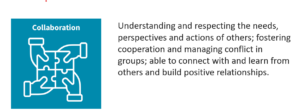
Welcome to the August-October Enhancement Theme: Group work, co-edited by Professor Hannah Chalmers, Professor Tim Stratford (School of Engineering) and Lesley Kelly (Institute for Academic Development).
In this Teaching Matters series, we will explore how group work for teaching and learning is used across the University. We will learn about the different ways group work is being developed and supported, how it is used to enrich student experience, to tackle problems together, test ideas, deepen understanding, and appreciate different perspectives. We will look at how to design group work to provide positive learning environments so that all students can benefit, and share how we address the challenges that come with group work.
Many of our students are spending increasingly large amounts of time working in groups across a broad range of subject areas and years of study. Well designed and supported group work can be a powerful learning opportunity for students, helping to develop key skills required beyond University (Francis et al., 2022). At the University of Edinburgh, our new Skills for Success Framework emphasises collaboration as a key skill for our students to develop:

Designing meaningful group work and fostering collaboration within and beyond classrooms can be difficult, and yet, when effective, highly rewarding. Within a diverse learning community like ours, students and staff have varied experience and expertise to draw on offering a range of perspectives that can enable us to build positive experiences of collaborative group work.
We (Hannah, Lesley, and Tim) know that at its best, a group class leaves us energised, learning with our students as we move in and out of their conversations, being inspired by their ideas, and providing feedback that steers them as they work. However, on other occasions things haven’t gone so well: our group exercise was not well designed, or we have spent more time mediating conflicts than facilitating. You might have had a similar experience?
Within the School of Engineering, we noticed that several colleagues were tackling similar challenges separately, which prompted Hannah and Tim to write a local guidance note: Group work: reflections and suggestions for engineering staff. This in turn motivated the Teaching Matters series: we wanted to learn more about group work across the University and recognised a need to share practice.
This series aims to enable sharing of practice through a comprehensive collection of blog posts that offer insight and examples of how we can enable rewarding, yet challenging, group work for our students.
We will delve into topics such as:
- Fostering effective intercultural teamwork among students;
- Group peer-to-peer teaching in the laboratory;
- Assessing student reflection on working in groups;
- Exploring complex interdisciplinary challenges through simulated group role-play exercise;
- The structure and anti-structure of project-based learning.
Through sharing challenges and lessons learned we hope to further develop resources to support both staff and students with designing and managing effective group work activities. The Institute for Academic Development will use the material generated by this series to further develop resources to support staff and students with developing and participating in group work.
Happy reading!
References
Francis N., Allen M., Thomas J. (2022) Using group work for assessment – an academic’s perspective AdvanceHE. Available at: https://www.advance-he.ac.uk/sites/default/files/2022-03/Using%20group%20work%20for%20assessment%20%E2%80%93%20an%20academic%E2%80%99s%20perspective.pdf (Accessed 30/07/25)
Gibbs, G. (2009) The assessment of group work: lessons from the literature ASKe. Available at: https://neillthew.typepad.com/files/groupwork-gibbs-dec-09.pdf (Accessed: 30/07/25)
 Hannah Chalmers
Hannah Chalmers
Prof. Hannah Chalmers holds a Personal Chair of Sustainable Energy Systems and is currently an academic co-lead for the implementation of the Skills for Success Framework. She is a Senior Fellow of the Higher Education Academy and has experience of facilitating group work in the Engineering curriculum with non-Honours, Honours and MSc students.
 Lesley Kelly
Lesley Kelly
Lesley Kelly is an Academic Developer in the Taught Students Development Team at the Institute for Academic Development (IAD). She helps students to develop their academic skills through the IAD core programme for UG and PGT students and works with staff in Schools to embed academic skills development in the curriculum. She is a Senior Fellow of the Higher Education Academy.
 Tim Stratford
Tim Stratford
Prof. Tim Stratford holds a Personal Chair of Civil Engineering Design. He teaches across a thread of engineering design courses that develop students’ abilities with creativity, contradiction, compromise, challenge, and communication (as well as calculations).


